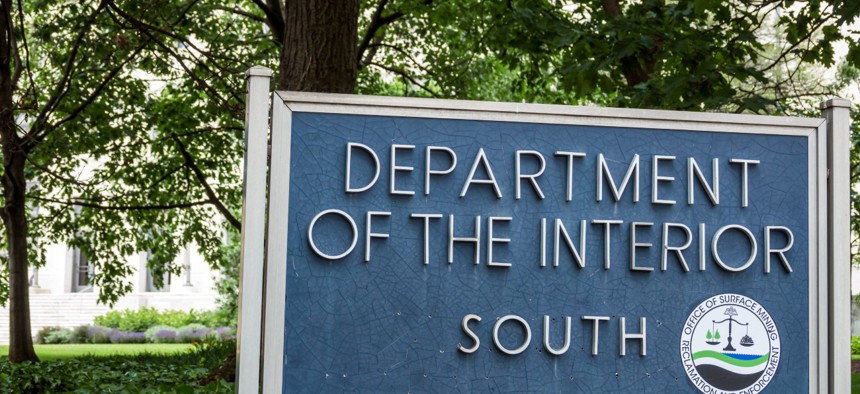
Jeff Greenberg/Getty Images
‘Deeply Disturbing’ Watchdog Report Examines How Interior Handled FOIA Requests Under Trump
Other agencies have in the past put the record requests through additional reviews.
A Cabinet agency under the Trump administration implemented an additional review process for public records requests that lacked clarity, which led to perceptions of “political considerations” in some instances, according to a new report.
The Interior Department inspector general office released a report on Feb. 25 about “awareness reviews” completed by the agency that were additional scrutiny for Freedom of Information Act requests that included emails, email attachments or calendar entries that had the names or email addresses of certain political appointees. The records were reviewed by the assigned Interior Office of the Solicitor attorney and “designated awareness reviewer,” who were either career or political officials. The policy was in place from May 2018 to January 2021. Roll Call reported on the policy and concerns associated with it back in May and June 2019 and E&E News reported in June 2019 that the Interior IG office received a swarm of complaints about the FOIA process.
Adam Marshall, senior staff attorney at the Reporters Committee for Freedom of the Press who is an expert in government transparency, told Government Executive on Thursday, “the findings of the inspector general report were deeply disturbing.”
The Interior Department “did not centrally track FOIA records as they went through the awareness review process,” so “we could not determine the overall impact of awareness reviews on the processing times of FOIA productions, nor could we select a representative sample of requests for this evaluation,” said the report. “We also found that unclear language in the awareness policy contributed to delays in reviews or changes to several of the FOIA requests we reviewed as well as to confusion on the part of some FOIA professionals.”
Finally, the IG office noted that “as to some of the case studies that we addressed, FOIA professionals expressed the belief to us that actions taken pursuant to the awareness policy were prompted by political considerations,” the report continued. “The policy’s lack of clarity and the lack of guidance on how it should be applied may well have contributed to this perception.”
For example, during an awareness review in 2018 for a request of emails between a National Park Service congressional liaison and then-Interior Secretary Ryan Zinke’s wife, in which she asked the liaison to coordinate a tour of a national park for an official at another agency and the official’s family, “a political appointee directed FOIA professionals to run a second search for responsive emails; this search required a different search tool, which reduced the number of responsive records from the 96 pages found in the original search to 16,” said the report.
The watchdog said that the awareness review process “replaced a number of informal practices during previous administrations.”
The department’s justification at the time of implementation was that FOIA requests and litigations had significantly increased, and the awareness reviews were meant to “ensure consistency and effectiveness in the DOI’s practice of notifying DOI leadership (and the [Office of the Solicitor], if needed) of ‘impending FOIA responses,’” said the report. Also, the Interior Department sought to align its FOIA responses across its offices and bureaus with responses to congressional inquiries. The department revised the policy in February 2019 in an attempt to clarify the roles and responsibilities of awareness reviewers, among other things.
In a footnote, the IG said these types of reviews aren’t “unique” to the Interior Department as other agencies such as the Consumer Financial Protection Bureau and Homeland Security Department, “perform similar reviews for records involving high-visibility or sensitive subjects,” it said. A CFPB official said the agency has done these reviews for at least the past five years and at DHS they started as early as 2009 and its most recent policy was enacted in 2018.
“Unfortunately, there's a long history of special reviews of FOIA requests and responses,” Marshall said, citing previous news reports from The Associated Press, The New York Times and Washington Free Beacon. “As the IG's report shows, such additional reviews can result in agencies unlawfully withholding records from the public.”
Although this FOIA policy has been rescinded, the IG gave recommendations if a similar one is instituted again: track the reviews in a centralized system, establish a policy with clear guidelines on how to handle reviews; denote a point of contact to manage and coordinate reviews as well as answer questions or resolve issues; and train FOIA professionals and reviews on the policy. After reviewing a draft of the IG’s report, Rachel Spector, deputy chief FOIA officer and director at Interior, requested certain edits to better clarify things, some of which the IG accepted.
Another matter at the Interior Department under the Trump administration involving FOIA was a proposed rule issued in late 2018 aimed at streamlining FOIA processing, which was met with criticism from environmental and government accountability groups as well as media organizations.
“The proposed rule seeks to reduce DOI’s FOIA backlog by limiting and delaying requesters’ access to information and public records,” the heads of American Oversight and the Democracy Forward Foundation said in a statement. “Other proposed changes would hinder transparency and public oversight.”
Daniel McGrath, staff attorney for American Oversight, wrote in a separate statement related to the proposed rule: “less than a week before he resigned, Zinke took the unusual step of giving a political appointee, former Koch brothers adviser Daniel Jorjani, the authority to oversee FOIA responses. Jorjani had previously, when discussing an OIG investigation related to Zinke, told DOI staff that “our job is protect the secretary.' The department’s new proposed regulations are issued under Jorjani’s supposed authority, and it is far from clear whether he has the authority to issue any proposed rules.”
The major concerning aspects were ultimately removed, but watchdog groups still had some trepidation about how FOIA requests would be handled, as The Hill reported in October 2019.







